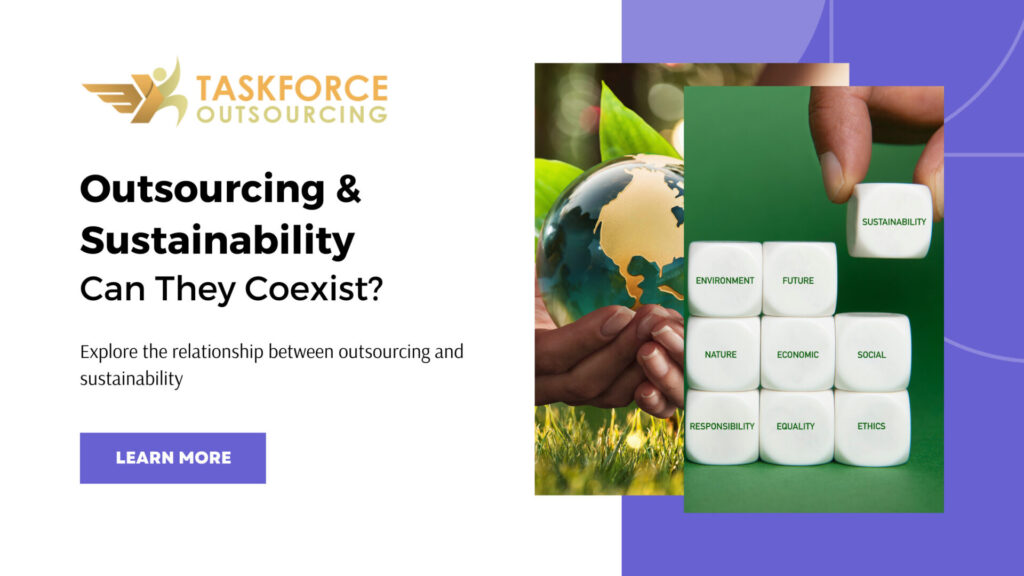Businesses nowadays are always looking for methods to reduce expenses and boost productivity. Outsourcing is one strategy that has grown more popular recently. The term “outsourcing” describes the involvement of a third-party organization to perform particular business operations or processes. While there are numerous advantages to outsourcing, including cost savings and improved productivity, it can also have detrimental effects on sustainability. This article will explore the relationship between outsourcing and sustainability and discuss ways in which they can coexist.
Outsourcing has been a common approach for companies wanting to cut costs and boost productivity. Many different tasks, including manufacturing, customer service, and IT support, can be outsourced. While outsourcing has many advantages, it can also harm sustainability. To guarantee that outsourcing does not negatively impact the environment or society, businesses must find a balance between savings and sustainability.
The Environmental Impact of Outsourcing
The environmental impact of outsourcing is one of its most severe drawbacks. Outsourcing might include long-distance transportation of products and services, which can raise greenhouse gas emissions. Outsourcing can also lead to the depletion of natural resources in the nations where goods are produced, such as water and energy.
Transportation
Long-distance delivery of products and services is frequently a part of outsourcing. Trucks, airplanes, and ships are all used in this transportation, which may result in an increase in greenhouse gas emissions. These emissions have the potential to damage the environment and accelerate climate change.
Depletion of Natural Resources
Natural resources in the nations where commodities are produced may be depleted as a result of outsourcing. In developing countries where laws may be less stringent than in developed countries, this might be highly disruptive. For instance, outsourcing clothing manufacturing to regions with poor water management methods may cause water resources to be depleted.
One example of a company depleting natural resources is the Chevron Corporation. The company has been accused of polluting the Amazon rainforest in Ecuador, which has caused significant damage to the environment and the health of the local population [1]. The company has also been accused of outsourcing its pollution to other countries, such as Nigeria, where it has been accused of polluting the Niger Delta [2].
The Social Impact of Outsourcing
In addition to the environmental impacts, outsourcing can also have adverse societal effects. As businesses transfer operations to nations with lower labor costs, outsourcing may lead to the loss of jobs in developed nations. Outsourcing may also contribute to subpar working conditions in the nations where items are produced.
Loss of Jobs
Outsourcing can lead to employment losses in developed countries as businesses relocate processes to nations with lower labor costs. This may result in financial hardship for those who lose their jobs as well as a decline in tax revenue for the nation where the jobs were lost.
One example of how outsourcing led to job loss in a developed country is the case of the United States. According to a report by the Economic Policy Institute and the National Employment Law Project, outsourcing has led to a decline in job quality and wages in the US, especially in the manufacturing and IT sectors [3]. Between 2000 and 2010, more than five million manufacturing jobs were lost in the US [4]. Outsourcing had a negative impact on the wages and employment opportunities of American workers, especially those with low skills and education levels [3].
Poor Working Conditions
Outsourcing can also lead to poor working conditions in the countries where goods are produced. Companies may be more likely to cut corners on safety and health regulations in countries with less strict regulations. This can lead to worker exploitation and harm to society.
An example of this is with the fast fashion retailer Shein. They have repeatedly come under fire for poor working conditions [5]. According to a non-governmental organization, some of its suppliers have been found to be practicing excessive overtime with workers doing 75-hour weeks. David Hachfeld of Public Eye said there was “enormous pressure” on workers to meet production targets, and that the company’s “fast fashion” business model was “inherently exploitative [6].
Balancing Outsourcing and Sustainability
While outsourcing can have negative impacts on sustainability, it is possible for outsourcing and sustainability to coexist. Businesses must take steps to ensure that outsourcing does not harm the environment or society. These steps can include choosing suppliers that prioritize sustainability and investing in sustainable technologies.
Choosing Sustainable Suppliers
One way that businesses can ensure that outsourcing does not harm sustainability is by choosing suppliers that prioritize sustainability. Businesses can conduct due diligence on suppliers to ensure that they have strong sustainability practices in place. This can include evaluating suppliers’ environmental and social impacts and ensuring that they meet sustainability standards.
A good example of this, as mentioned in our previous blog, Purpose-Driven Outsourcing: Making a Positive Impact through Outsourcing, is the partnership between Starbucks and Conservation International, a nonprofit organization that works to protect the environment.
Investing in Sustainable Technologies
Another way that businesses can balance outsourcing and sustainability is by investing in sustainable technologies. For example, businesses can invest in renewable energy sources to power their operations or use sustainable materials in their products. By investing in sustainable technologies, businesses can reduce their environmental impact and contribute to a more sustainable future.
Purpose-Driven Outsourcing
Purpose-driven outsourcing is a concept that combines the benefits of outsourcing with the principles of sustainability and social responsibility. Purpose-driven outsourcing involves outsourcing to companies that share the same values and commitment to sustainability and social responsibility. This was discussed in detail in our previous article, Purpose-Driven Outsourcing: Making a Positive Impact through Outsourcing.
Conclusion
Outsourcing and sustainability are not mutually exclusive. While outsourcing can have negative impacts on sustainability, it is possible for businesses to strike a balance between cost savings and sustainability. By choosing sustainable suppliers and investing in sustainable technologies, businesses can ensure that outsourcing does not harm the environment or society. In today’s global economy, it is more important than ever for businesses to prioritize sustainability and contribute to a more sustainable future.
Solutions for tackling the problem of outsourcing and sustainability include:
Sustainable supplier selection
Businesses can choose to outsource to suppliers that prioritize sustainability and social responsibility. By selecting suppliers that share the same values and commitment to sustainability, businesses can ensure that their outsourced operations are conducted in a sustainable and socially responsible manner.
Sustainable technology adoption
Businesses can invest in sustainable technologies, such as renewable energy sources, sustainable materials, and energy-efficient technologies, to reduce their environmental impact and promote sustainability.
Transparency and accountability
Businesses can increase transparency and accountability in their outsourced operations by regularly monitoring and reporting on their environmental and social performance. This can help to identify areas for improvement and encourage suppliers to adopt more sustainable practices.
Collaboration and partnership
Businesses can work collaboratively with their outsourced partners to identify and address sustainability challenges. By working together, businesses and their partners can develop more sustainable solutions and contribute to a more sustainable future.
Purpose-driven outsourcing
Purpose-driven outsourcing involves outsourcing to companies that share the same values and commitment to sustainability and social responsibility. By outsourcing to purpose-driven suppliers, businesses can ensure that their outsourced operations are conducted in a sustainable and socially responsible manner.
By implementing these solutions, businesses can ensure that outsourcing and sustainability can coexist. By prioritizing sustainability and social responsibility, businesses can contribute to a more sustainable future, while also reaping the benefits of outsourcing.
Frequently Asked Questions (FAQs)
A: Outsourcing is the process of hiring a third-party company to handle certain business functions or processes.
A: Outsourcing can have negative impacts on sustainability, such as increased greenhouse gas emissions, depletion of natural resources, loss of jobs, and poor working conditions.
A: Businesses can balance outsourcing and sustainability by choosing sustainable suppliers and investing in sustainable technologies.
A: Examples of sustainable technologies include renewable energy sources, sustainable materials, and energy-efficient technologies.
A: Sustainability is important for businesses because it can reduce environmental impacts, improve social responsibility, and contribute to a more sustainable future. Additionally, consumers are increasingly prioritizing sustainability when making purchasing decisions, so businesses that prioritize sustainability may have a competitive advantage.
As a purpose-driven outsourcing provider, our business is committed to sustainability and social responsibility, making us a great choice for companies looking to outsource in a sustainable and responsible manner. By working together, we can contribute to a more sustainable and equitable future for all.

By opportunity, training, education, and support, Taskforce Outsourcing aims to empower those who are underprivileged or in need. Our goal is to assist these individuals in becoming self-sufficient and realizing their full potential.
This is not just a business strategy for us, it is at the very core of who we are and what we believe in.
We are committed to quality services at an affordable price, and to helping small businesses grow and succeed through outsourcing. Contact us today to learn how we can be your outsourcing partner and support your business success.
Sources:
- Zelman, J. (2011, January 24). Chevron Accused Of ‘World’s Worst Oil-Related Disaster’ In $113 Billion Lawsuit. HuffPost. Retrieved March 20, 2023, from https://www.huffpost.com/entry/chevron-accused-by-ecuado_n_813117
- Oil giants Shell and Chevron Canalization polluted Tsekelewu Community, Nigeria | EJAtlas. (2018, March 15). Environmental Justice Atlas. Retrieved March 20, 2023, from https://ejatlas.org/conflict/shell-chevron-canalization-devastes-tsekelewu-community
- Cathie. (2022, November 4). The Negative Impact Of Job Outsourcing On Unemployment. Retrieved March 20, 2023, from https://www.listfoundation.org/the-negative-impact-of-job-outsourcing-on-unemployment
- Scott, R. E. (2015, August 11). Manufacturing Job Loss: Trade, Not Productivity, Is the Culprit. Economic Policy Institute. Retrieved March 20, 2023, from https://www.epi.org/publication/manufacturing-job-loss-trade-not-productivity-is-the-culprit/
- Singh, S. (2022, October 17). Shein Is Even Worse Than You Thought. The Cut. Retrieved March 20, 2023, from https://www.thecut.com/2022/10/shein-is-treating-workers-even-worse-than-you-thought.html
- Jones, L. (2021, November 12). Shein suppliers’ workers doing 75-hour week, finds probe. BBC. Retrieved March 20, 2023, from https://www.bbc.com/news/business-59245708

